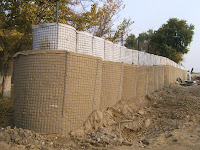The only thing that I can see that has changed about the American's ability to send packages is that the volume has increased to where every service member deployed has had to have gotten at least one box from home. When I say home, I don't necessarily mean from a relative. I mean all types of supporters from everywhere in the US.
There is a woman in Ohio that sent pre-lit Christmas trees as well as packages of food to both our forward Tactical Operations Center (TOC) in Jalalabad as well as our brigade home base near Kabul. There is a couple in Frederick Maryland who took the time to individually write a note and attach an addressed envelope to eight boxes full of gifts so that each member of this command got one. Each gift was a small travel bag filled with candy and toiletries.
A Ford dealership (Bob Davidson - Parkville, MD - Great Selection, Come on down... Shameless, aren't I?) has sent over 200 pounds of boxes containing snacks, toiletries and home baked cookies to our brigade as well as hundreds of pounds more to deployed Marylanders in Iraq and at Guantanamo Bay.

This is all great, except for one big thing; the mail handlers at Bagram and other airfields where the boxes are coming in are overwhelmed. The boxes have to be prioritized and shipped by truck to other larger bases like Camp Phoenix and Jalalabad where the commands there break them down by unit and get them to their commands. We get them and have to figure out what can fit into our HumVees to be sent to forward locations to those that need them. An awful lot of times the packages that are not labeled from the service member's family have to be held at the unit mail room until another convoy, with room for mail, can take them out. More stuff is coming in daily so the backlog continues.
Now I feel the need to point out two major factors. First, we appreciate the packages from home and love getting the stuff to push out to the service members. Second, enough credit to all of the mail handlers in these units can not be over-stressed. They struggle daily with how to get as much stuff out to the troops as possible and they are incredible in their abilities to do just that. They work long, thankless hours. Not all of them work just the postal job. In most units the responsibility of mail handling is a shared job among the support people in a unit. In my brigade, Our supply sergeant, a Senior Airman in supply and a Petty Officer in our admin shop all work to get the mail sorted and sent forward. They do an outstanding job and I know that I am not alone in my praise for them.
The actual Postal Units that work here (like a Post Office at home) are manned primarily by Army Reservists. Most of their Soldiers rotate the responsibility of going out to units to take in mail, collect payment and ensure that it is protected during the ride back to Camp Phoenix and Bagram. They then make sure that they are mailed out. Most of the guys we see are from the 99th Reserve Support Command out of Pennsylvania and the Soldiers are from the mid-Atlantic states.
And I have to mention the letters, cards, school packages (with notes from students) that we get. They are handed around and read many times. One particular note from a Cub Scout in North Carolina showed a picture of a tank with a "force field" around it. An obvious "bad guy" had just fired a shoulder fired rocket at the tank and the force field protected it. This was his idea of a Veteran's Day card and we all got a kick out of it.
Thanks to you all for your prayers, packages, cards and thoughts. It means a lot to us.
Sarmajor






